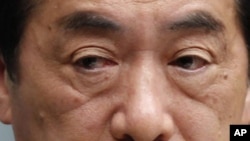Japanese Prime Minister Naoto Kan is facing new calls for his resignation from senior opposition and ruling party lawmakers angered by his response to the country's earthquake and tsunami-triggered nuclear crisis.
Japan's main opposition Liberal Democratic Party leader Sadakazu Tanigaki said Thursday it was time for Kan to decide whether to resign because of what Tanigaki called the prime minister's poor handling of relief operations. He said continuing with Japan's current leadership would be "extremely unfortunate" for the Japanese people.
Kan's opponents initially refrained from criticizing him after a magnitude 9.0 earthquake and massive tsunami hit the Pacific coast of Japan's Honshu island and crippled a nuclear plant on March 11. Since then, he has appealed for cross-party cooperation to help the country recover from its worst post-war disaster.
Intensified calls
Kan also faced a call for his departure Thursday from inside his ruling Democratic Party of Japan. Upper house speaker Takeo Nishioka said the prime minister must quit for failing to properly handle the triple disaster's aftermath. A day earlier, a DPJ rival of the prime minister, Ichiro Ozawa, criticized his crisis management.
Kan focused Thursday on reconstruction, chairing the first meeting of an expert panel appointed to draft an economic revival plan for the disaster zone. Panel leader Makoto Iokibe said reconstruction plans must have the support of the whole nation. He also suggested creating a special tax to pay for the efforts. The 15-member body is due to present its first proposals in June.
Japan's police agency said its latest casualty figures show the quake and tsunami killed about 13,500 people and left 14,700 others missing. Japanese police searching for the missing moved to within 10 kilometers of the crippled Fukushima nuclear plant for the first time Thursday, wearing white, protective suits to shield them from radiation that has leaked from the facility since the disaster.
Climbing death toll
Officials say the team of 300 officers found 10 bodies in the debris of a tsunami-devastated town near the plant. Japanese media say about 1,000 bodies may be in the area.
Searchers had stayed out of the 10-kilometer zone because of high radiation levels, but authorities ordered them to recover bodies before they deteriorate to the point where they become a health hazard and impossible to identify.
Japanese Emperor Akihito and Empress Michiko also made their first visit to the worst-hit areas Thursday, comforting survivors at two emergency shelters in the city of Asahi in Chiba Prefecture. The royal couple also plan to visit the disaster-affected prefectures of Iwate, Miyagi and Fukushima in the coming weeks.
At least 140,000 people are still living in shelters in the region after losing their homes to the earthquake and tsunami or evacuating a government-declared 20-kilometer exclusion zone around the Fukushima plant due to high radiation.
Emergency crews at the plant have been trying to pump out water that became contaminated after being doused on its reactors to keep them from overheating. Pumping out the radioactive water could help the crews to resume repair work aimed at restoring the reactors' original cooling systems to stop them from spewing radiation.
Continuing aftershocks
The Tokyo Electric Power Company that operates the plant said Thursday it is moving some equipment to higher ground after a series of strong aftershocks raised the risk of a new tsunami.
The latest strong aftershock came at about 6 a.m. local time Thursday, with a magnitude of 6.1. It was the fourth temblor since Monday with a magnitude of 6 or greater. Hundreds of aftershocks have rattled Japan's northeastern coast since last month's massive earthquake.
In a sign of the economic cost of the disasters, the Japanese government said the number of foreign visitors to the country plunged 50 percent in March from a year earlier, to 352,800 people.
The Japan National Tourism Board attributed the drop to media reports about the catastrophe and warnings by some foreign governments to their nationals to avoid travel to Japan.
Some information for this report was provided by AFP.




